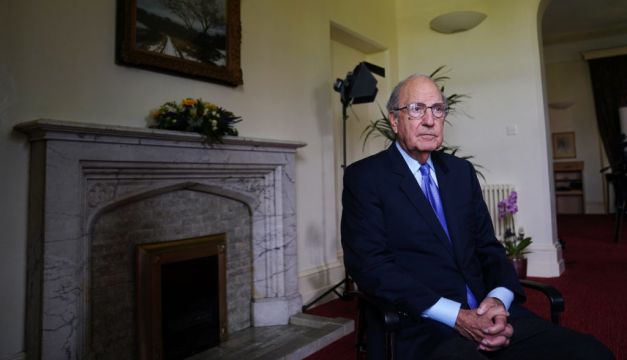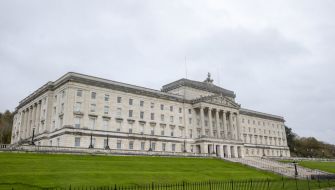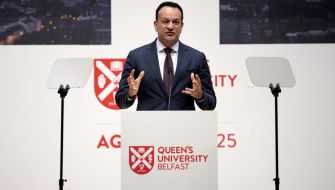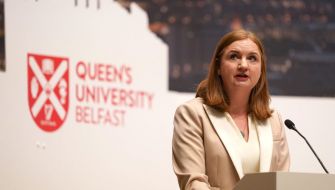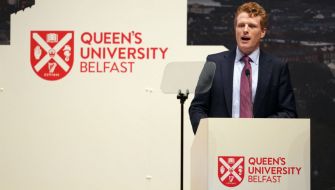US peace envoy George Mitchell says he holds out hope he will be able return to Northern Ireland in the company of his children.
The former senator (89), who has undergone three years of intensive treatment for leukaemia, revealed his attendance at this week’s landmark conference commemorating the Good Friday Agreement was in doubt just days before he flew out.
Mr Mitchell, who chaired the 1998 Good Friday negotiations to their successful outcome, told the PA news agency that he had made alternative arrangements to address the event at Queen’s University from a TV studio in the United States.
The speech delivered by the veteran diplomat on the first day of the conference has been lauded as the most impactful of the entire event.
As he prepares to return to the United States on Friday, Mr Mitchell described his visit to Northern Ireland as “very meaningful and emotional”.
“Three years ago I was diagnosed with acute leukaemia and was very seriously ill and I thought that my travelling days were over,” he said.
“But, fortunately – and this is the first time in three years that I’ve attended and spoken at a major public event – I was able to make this trip and I’m very grateful for it.”
Mr Mitchell said he and his family had come to love Northern Ireland and its people.
“And I wanted to come personally to thank people here for the courtesy and hospitality and warmth with which they’ve received me and my family and to convey my hope, my genuine sincere hope, that people of Northern Ireland will get the self-governance that they’re entitled to, that they need to make progress and that they will continue in their efforts to make it possible for every child in Northern Ireland to go as high and as far as their talent and willingness to work will take them,” he said.
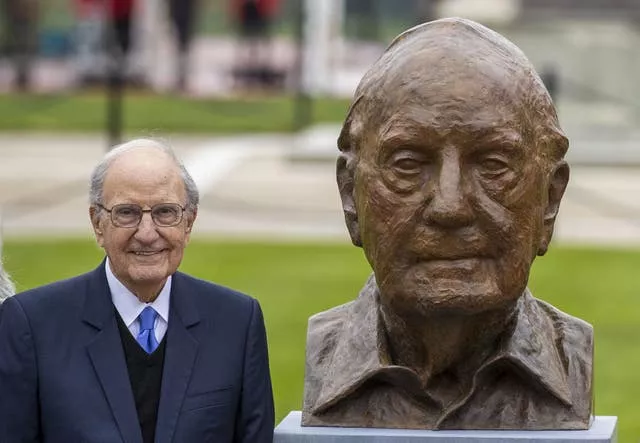
“That’s the fundamental aim of democratic societies everywhere. And Northern Ireland, I think more than most, has people of energy, commitment and they deserve that chance.”
On his contingency arrangements if he had been unable to travel, Mr Mitchell said: “I made alternate plans, a television studio in the United States to do my address by videotape, if that was necessary,” he said.
“But a few days before, I went to the hospital, went through some tests with my doctor, and he thought it was fine but I had to be careful and prudent about how much I do.
“And, so far, while the chemotherapy that I received over the past three years is necessary to combat the cancer, it greatly weakens your body and leaves you lacking in stamina and energy, so I’ve had to pace myself a little bit, get tired a little bit, but really it was well worth it.”
A bronze bust of the talks mediator was unveiled at Queen’s University to mark the anniversary of the accord.
“I don’t know if this is my last trip or not to be perfectly frank, I don’t know what’s going to happen,” he said.

“The doctors have told me that I might go for a period of time without a resumption of cancer and die from something else, I’m going to be 90 years old in a couple of months.
“On the other hand he said the cancer might come back in a few months and you’ll have to go back into chemotherapy. So I live every day thanking God that I’m still here and still around and, for me, it’s wonderful to be able to come back here.
“I’ve seen many old friends that I had not seen for a very long time, renewed acquaintances.
“Things take on a different context and a different meaning when you reach the stage of life that I have reached, and I enjoy what we would think of as routine things more than I appreciated and did before.
“And my children love Northern Ireland on the occasions that they came and I hope very much I can come back again, not at any conference, but just as a visitor, as I had often, and have my children come with me, but I can’t be sure of that.
“So I want to make the most of this visit as I can.”
